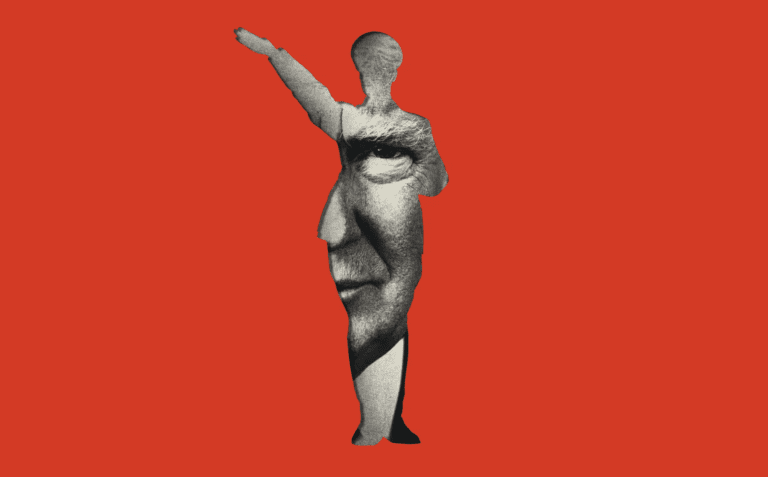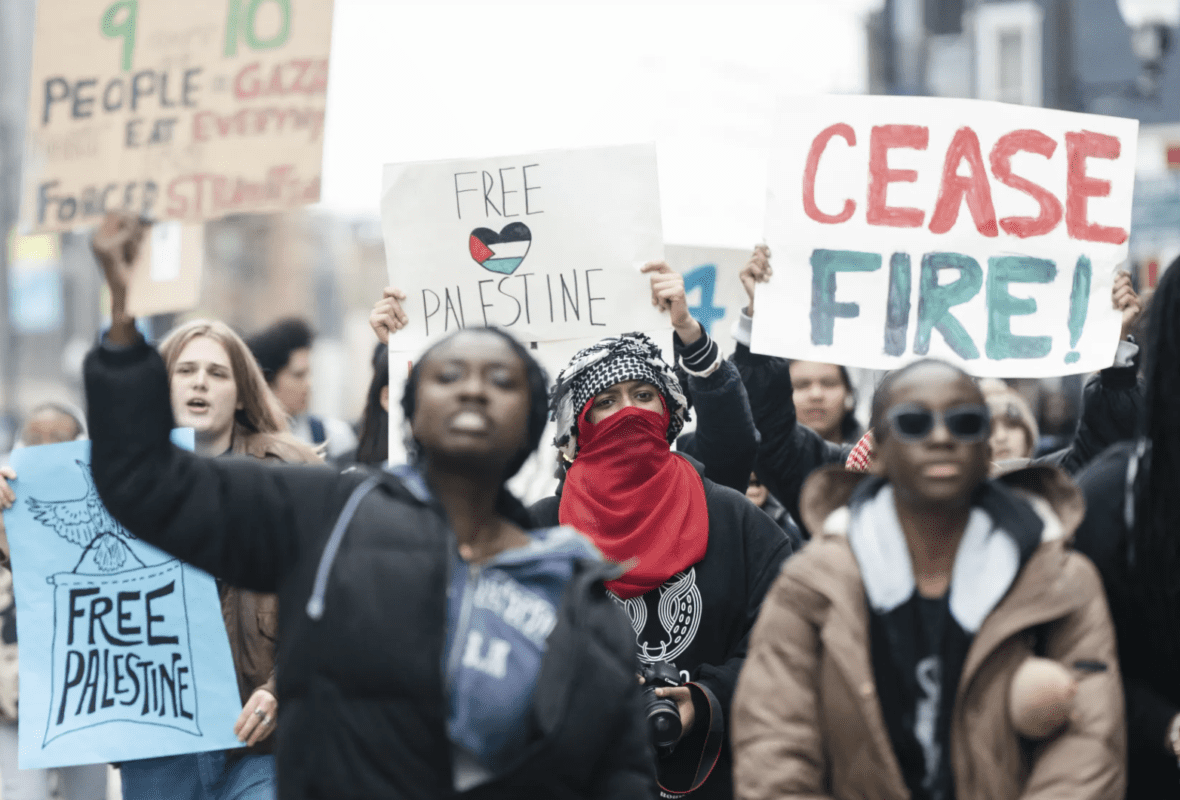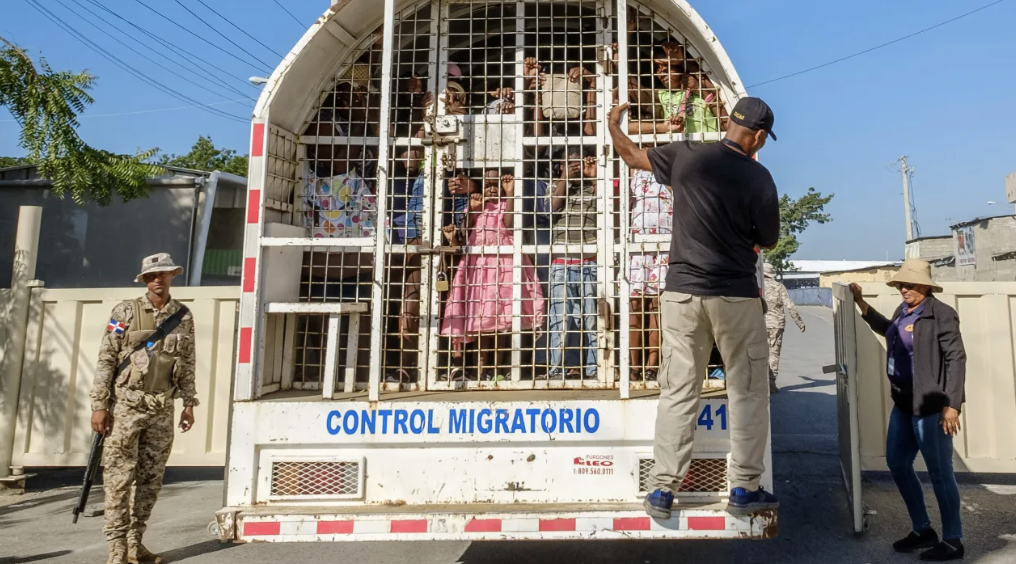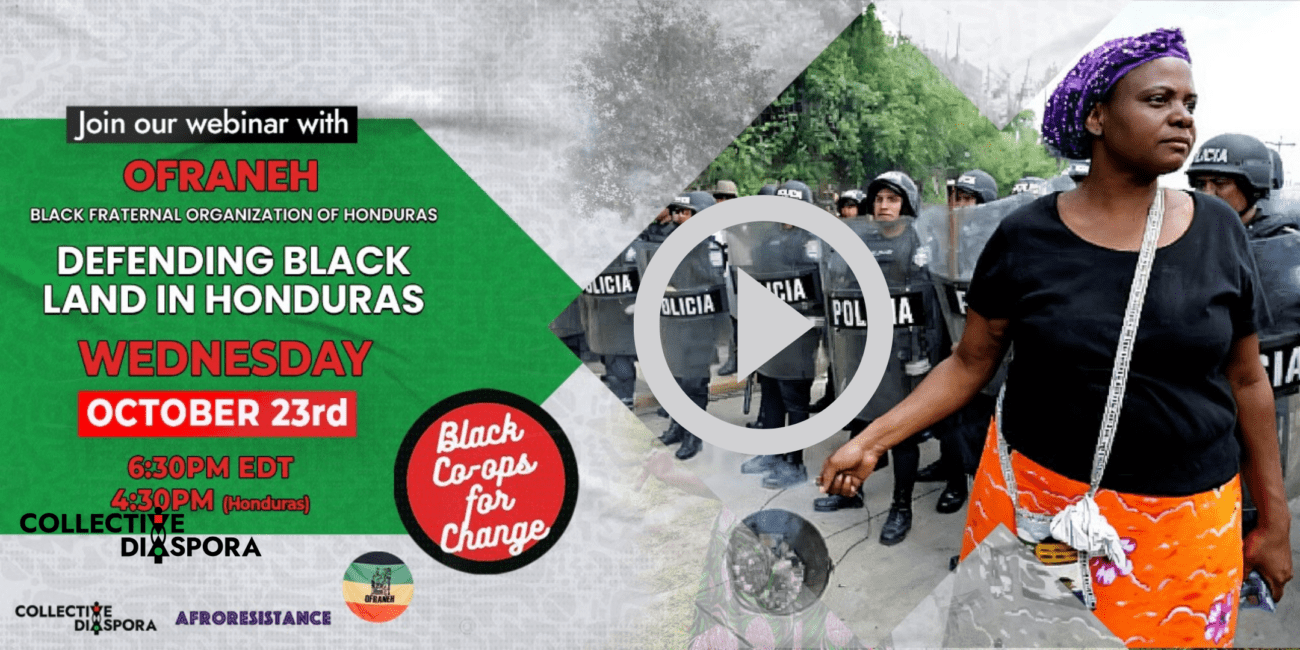
November 2024
In this issue we take a look at Donald Trump’s return to the US presidency, the rise of fascism, and what lies ahead for solidarity economy organizing.
Keep scrolling for the newest news and resources across the global Black solidarity economy, and the latest on what we’re up to at Collective Diaspora.
Like what you’re reading? Help us to keep producing it with a donation.
Maroon Dispatches
News from across the global Black solidarity economy

Illustration: Joan Wong/The Guardian
Waking up in Trump World (US)
On the morning of November 6th, a wave of despair and grief swept among U.S. Black solidarity economy organizers and social justice activists of all kinds as news spread that Donald Trump had been elected 47th president of the United States. Almost immediately, across social media and chat groups, attempts to collectively process ranged from expressions of grief to pep talks about resilience.
Kamala Harris’ late entry into the presidential race as potentially the first Black woman and South Asian president brought excitement to the Democratic party, which had been in a free fall after President Biden’s disastrous debate performance against Trump. But even before then, the party had been struggling in the face of economic insecurity and a growing public outrage over US support of Israel’s live-streamed genocide against Palestinians.

Image: Pat Nabong/Sun-Times
The excitement quickly dissipated for many as Harris refused to commit to end the flow of US weapons making the genocide possible. As a result, in states where Democrats felt it was safe not to vote for their party’s candidate, fewer people did. And for the first time in over 20 years, Democrats lost the popular vote. But presidential elections in the US are won at the state level. And there too Harris lost to Trump, by a mere 780,000 votes in 7 states.
Trump mobilized more voters in those battleground states and took the lead by appealing to patriarchy, white supremacy, and homophobia. He laid the blame for the economic anxieties of working class families not on the wealthy elite he’s part of, but on immigrants and the government. The same government that white supremacists have been convincing everyone to hate since the days of school desegregation. And he positioned himself as an outsider with the nerve to do whatever it takes to “drain the swamp” of government.
In less than 2 weeks Trump is already moving full steam ahead with cabinet picks that will help him consolidate power, use the military on domestic soil, gut environmental and public health regulations, gut the capacity of any government agency to regulate corporations, transfer more wealth to the largest corporations, use the military against China and socialist governments in the Americas, and deport more than 11 million people.
As you read this, the US Congress is preparing to pass a bill (HR 9495) that would give Trump unilateral authority to revoke the nonprofit status of any organization he deems to be “terrorist supporting” without requiring evidence or explanation. If passed the bill is expected to have a chilling effect not just on Pro-Palestinian protests, but on all dissent against Trump’s policies more broadly.

Image: Common Dreams
Trump’s past rhetoric and current actions should leave no doubt that we are witnessing the rise of fascism in the US. These are the desperate swings of a US empire fighting to hold onto power as more people are stretched thin by an economic system that produces ever more inequality in the face of repeated economic crises. That’s how capitalism works, and it’s what produces fascists.
When the status quo fails to deliver prosperity, the establishment parties fail to hold. That applies not just to Democrats, but Republicans too, as Donald Trump has completely taken over the Republican party and is refashioning it in his own far-right fascist image.
Trump’s influence goes well beyond the US, having already inspired a growing wave of white supremacist fascism as seen in the growing numbers of border walls in the Americas.
Last February, the Dominican Republic, fueled by a growing wave of far-right nationalism, a long history of anti-Blackness, and Trump’s example, began construction of a wall along its border with Haiti. Today Dominican immigration police scour street corners, buses, and hospitals across the country detaining anyone dark skinned in order to meet President Luis Abinader’s pledge last month to deport 10,000 Haitians each week.

Ricardo Hernandez / AP
Where does this leave us now?
Black communities in the US (which include women, immigrants, queer folks, and muslims) are bracing for a string of worst case scenarios coming to life: mass incarceration and deportation in hyperdrive; disappearing public services; collapsing infrastructure; nonexistent disaster relief; unregulated environmental racism; reproductive injustices; and restricted access to education,freedom of religion, sexual expression and dissent. Each its own crisis.
We know that the way out of a crisis is always together. And those of us in the Black solidarity economy know that crises always lead to an increase in cooperatives. We know this from our experience building the food co-ops, sou sous, mutual aid networks, and worker cooperatives our communities need when there are no grocery stores, banks, disaster relief services or employers to be found.
But there’s something even more critical to realize as we prepare to face one crisis after another. The solidarity economy is about more than getting our basic needs met. We’re laying the foundation for a way out of capitalism, an economy that strengthens relationships instead of commodifying and breaking them. And we’re doing it by honing the tools and skills needed to work together, make decisions together, manage our conflicts together, and listen and care for each other in the process. These are the ways of operating at the heart of shared ownership & control, the defining features of cooperatives and the solidarity economy.
Our fight against fascism rests on our ability to normalize the radical idea that regardless of whether it’s supplying groceries, setting workplace policies, or determining a city’s budget, those that are impacted by a decision get to have a say.
Are we perfect? Hell no! Do we get it wrong and fall flat on our faces? Absolutely! It’s how we learn and get better. How well we do that and share those lessons is the challenge for our movement over these next four years to come.
| |
|
Collective Diaspora NewsOur Black Co-ops for Change webinar series continued last month as we dug into the crisis facing the Garifuna people of Honduras in their struggle to hold onto their ancestral lands. Representatives of the Black Fraternal Organization of Honduras (Organización Fraternal Negra Hondureña - OFRANEH) shared about the history of the Garifuna of Honduras; managing land collectively; women-led organizing; assassinations of Garifuna land defenders, the forced displacement and mass exodus of Garifuna to the U.S., and U.S. backing of right wing Honduran governments.
The recording of that session is up on our website along with previous sessions from our Black Co-ops for Change series. |
You can also read a partial transcript of the webinar here:
| |
Model Law boosts co-operative movement in Africa (Africa-wide)
Introducing the People's Network for Land and Liberation (US)
USDA and Reinvestment Fund announce investments to increase equitable access to healthy foods through co-ops [Shout Out to recipients: Fertile Ground Food Co-op & Mandela Partners] (US)
Restorative Economics: A Values-Based Roadmap to a Just Economy (US)
[In Memory of Clark Arrington] Inspired by Marcus Garvey, he innovated worker cooperative financing and legal strategies (US)
UK ‘open to discussing non-cash forms of reparatory justice’ for former colonies (UK)
We Are The Relief: How Queer Appalachian Mutual Aid Showed Up After Helene (US)
North Carolina electric co-op powers first electric school buses in its region (US)
Resource Library: Podcasts & Videos
La Cooperativa Afroamericana Del Choco Para El Mundo (La Otra Historia con Boris)
Keep It In The Culture at the Backstreet Culture Museum Podcast - Season 2 (BackStreet Media)
Making Cannabis Cooperative: community ownership and racial justice in the cannabis industry (US Federation of Worker Cooperatives)
Black Co-ops for Change: OFRANEH - Defending Black Land in Honduras (Collective Diaspora)
The Transformative Potential of a Union–Co-op Alliance (Non Profit Quarterly)
SLCUL Discuss New Cooperatives Societies Act And Sectoral Growth (Choice TV Saint Lucia)
Claude Hendrickson - Self-Build Housing, Pardna and Access to Co-operative Opportunities (The Ubele Initiative)
Maya Pen: How communities of color can use collective wisdom to thrive (Non Profit Quarterly)
What The Bleep is a Co-op? (Cooperation New Orleans)
Cooperation Jackson (Disrupt the Chaos)
Digging Deeper
Websites, Books, Journal Articles, Reports, and More
Factors Influencing a Black Small Business Owner’s Decision to Sell their Business to a Worker Cooperative (Research Brief)
The brief investigates the decision-making factors influencing Black small business owners considering transitioning to worker cooperatives.
Building Collectively: 4 Takeaways from Movement-Led Community Ownership Models (Report)
This report offers an orientation to both the tactical and transformative strategies needed to enable community ownership. It explores examples of relationships between funders and fundees, the role of communication and education in fostering and sustaining change, and the importance of building coalitions and ecosystems to strengthen and broaden bases of support.
Worker Co-op & Democratic Workplace Mini-Guides (Toolkit)
This series of short guides on the fundamentals of worker ownership are designed for worker co-ops and democratic workplaces and are prepared by the US Federation of Worker Cooperatives’ Co-op Clinic. The mini-guides cover the following areas:
Setting Membership Fees
Co-op Structure & Decision-Making
Building Your Team, Hiring & Onboarding
Building Your Board of Directors
Effective Worker Co-op Boards
Conflict Resolution in Democratic Workplaces
Worker Co-op Founders Compensation
2023 Worker Cooperative State of the Sector Report (Report)
This report by the Democracy at Work Institute and the US Federation of Worker Cooperatives covers changes and the latest developments in the worker cooperative sector in the US.
Funding
Who’s Offering What
Collective Courage Fund applications due Nov. 25th (US)
Is your co-op looking for funding? CCF is currently accepting applications from Black-led and serving food and land based co-ops. Review the funding announcement for eligibility requirements, to find the application, etc. If you have any questions, please email jamila@partnershipfunds.org
New Economy Project Loans (US)
The New Economy Project is offering non-extractive loans to community land trust projects in NYC, and has already funded $1 million to BIPOC low-income communities.
Solidarity Economy Funding Library (US)
This is an online directory for people to find funding, investing, and fiscal sponsorship opportunities, as well as detailed relationships between movement organizations and funders.
No Movement Without Art
Songs, Film, Murals, and Paintings
Upcoming Events
Nov 1-15 - 6th Annual Black Solidarity Cultural Tour, Tanzania - Building Blocks of Afrofuturism (Tanzania)
Nov 6-8 - Digital Africa Rising conference (Mombasa, Kenya)
“Digital Africa Rising” is a collaboration between the Platform Cooperativism Consortium and The Co-operative University of Kenya. The conference brings together practitioners, policymakers, advocates, and academics to focus on creating an African digital future rooted in cooperativism, using platform co-op models for grassroots economic development.
Nov 13 - #BlackTrust: Black Utopias, Then & Now (Boston)
Nov 18 - Understanding and Building Worker-Owned Cooperatives - Part 1:Introduction to Worker-Owned Cooperatives (online)
Nov 20 - Facing Race 2024 (St. Louis, Missouri, US)
The largest multiracial, intergenerational racial justice conference in the US.
Nov 25 - Understanding and Building Worker-Owned Cooperatives - Part 2: Building and Sustaining a Successful Worker-Owned Cooperative (online)
Nov 25-30 - International Cooperative Alliance - Global Cooperative Conference (New Delhi, India)
Nov 26 - SOFT LAUNCH of new food market data app
Join a special early presentation of a new app (YAMS: Yielding Access to Market Solutions) developed by the National Black Food & Justice Alliance and learn ways to spread the word. The app aims to take back power over food shopping data and this tool can advance use and access to meaningful information. Click Zoom link at 4PM ET to join.
Nov 30 - Chocolate Rebellion Global Pop-Up
On the 30th of November, 14 locations in 11 different countries will host a pop-up event focused around chocolate! On this day we aim to celebrate the long journey of chocolate from the bean to the bar and celebrate the people and communities who make up the world of cocoa. Pop-Up events will be held all over the world in the Caribbean (Trinidad and Tobago, Nevis, Saint Lucia); Africa (Ghana, Côte d'Ivoire, Cameroon); North America (USA); Europe (Denmark, UK, France)
Dec 10-12 - 12th annual International Society for Markets and Development conference (Ghana)
The conference theme is: Destabilizing Development? – Markets, Climate, Democracy and Technologies. Dr. Caroline Hossein is coordinating a solidarity economy track for the conference.


